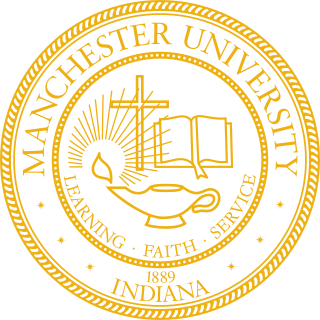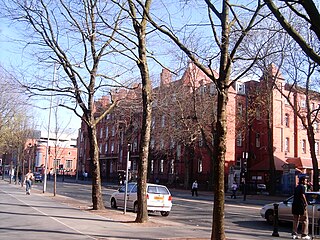
Manchester United Football Club is a professional football club based in Old Trafford, Greater Manchester, England, that competes in the Premier League, the top flight of English football. Nicknamed "the Red Devils", the club was founded as Newton Heath LYR Football Club in 1878, changed its name to Manchester United in 1902 and moved to its current stadium, Old Trafford, in 1910.

John Dalton FRS was an English chemist, physicist, and meteorologist. He is best known for introducing the atomic theory into chemistry, and for his research into colour blindness, sometimes referred to as Daltonism in his honour.

Greater Manchester is a metropolitan county and combined authority area in North West England, with a population of 2.8 million. It encompasses one of the largest metropolitan areas in the United Kingdom and comprises ten metropolitan boroughs: Bolton, Bury, Oldham, Rochdale, Stockport, Tameside, Trafford, Wigan, and the cities of Manchester and Salford. Greater Manchester was created on 1 April 1974 as a result of the Local Government Act 1972, and designated a functional city region on 1 April 2011.

The University of Manchester is a public research university in Manchester, England, formed in 2004 by the merger of the University of Manchester Institute of Science and Technology and the Victoria University of Manchester. The University of Manchester is a red brick university, a product of the civic university movement of the late 19th century.

Manchester is a town in Hartford County, Connecticut, United States. As of the 2010 census, the town had a total population of 58,241. The urban center of the town is the Manchester census-designated place, with a population of 30,577 at the 2010 census. The town is named after Manchester, in England.

Manchester University is a private liberal arts university associated with the Church of the Brethren and two campuses, one in North Manchester, Indiana and another in Fort Wayne, Indiana. The university's main campus is in North Manchester with the Fort Wayne campus hosting the university's pharmacy and pharmacogenomics programs. Total enrollment is approximately 1,600 students.

Odd Fellows, or Oddfellows, also Odd Fellowship or Oddfellowship, is an international fraternity consisting of lodges first documented in 1730 in London. The first known lodge was called Loyal Aristarcus Lodge No. 9, suggesting there were earlier ones in the 18th century. Notwithstanding, convivial meetings were held "in much revelry and, often as not, the calling of the Watch to restore order." Names of several British pubs today suggest past Odd Fellows affiliations. In the mid-18th century, following the Jacobite risings, the fraternity split into the rivaling Order of Patriotic Oddfellows in southern England, favouring William III of England, and the Ancient Order of Oddfellows in northern England and Scotland, favouring the House of Stuart.

The Heaton Park Tramway is a heritage tramway running old trams as a visitor attraction in Heaton Park, Manchester.

Sir Arthur Harden, FRS was a British biochemist. He shared the Nobel Prize in Chemistry in 1929 with Hans Karl August Simon von Euler-Chelpin for their investigations into the fermentation of sugar and fermentative enzymes. He was a founding member of the Biochemical Society and editor of its journal for 25 years.
Centre-right politics or center-right politics, also referred to as moderate-right politics, are politics that lean to the right of the left–right political spectrum, but are closer to the centre than other right-wing politics. From the 1780s to the 1880s, there was a shift in the Western world of social class structure and the economy, moving away from the nobility and mercantilism, as well as moving toward the bourgeoisie and capitalism. This general economic shift toward capitalism affected centre-right movements such as the British Conservative Party, that responded by becoming supportive of capitalism.

The Computer Conservation Society (CCS) is a British organisation, founded in 1989. It is under the joint umbrella of the British Computer Society, the London Science Museum and the Manchester Museum of Science and Industry.

The School of Medical Sciences at the University of Manchester is one of the largest in the United Kingdom with around 6,000 undergraduates, 3,000 postgraduates and 2,000 staff. It is the third oldest medical school in England and the largest medical school in the United Kingdom. The Faculty is a member of the Manchester Academic Health Science Centre and has four affiliated teaching hospitals at Manchester Royal Infirmary, Wythenshawe Hospital, Salford Royal Hospital and the Royal Preston Hospital.

Manchester Royal Eye Hospital is an ophthalmic hospital in Manchester, England. It is managed by the Manchester University NHS Foundation Trust. It is located on the same site as the Manchester Royal Infirmary and St Mary's Hospital for Women and Children.

The Society of Artists of Great Britain was founded in London in May 1761 by an association of artists in order to provide a venue for the public exhibition of recent work by living artists, such as was having success in the long-established Paris salons. Leading members seceded from the society in 1768, a move leading directly to the formation of the Royal Academy of Arts. The society was dissolved 1791 after years of decline.

The Sackville Street Building is a building on Sackville Street, Manchester, England. The University of Manchester occupies the building which, before the merger with UMIST in 2004, was UMIST's "Main Building". Construction of the building for the Manchester School of Technology began in 1895 on a site formerly occupied by Sir Joseph Whitworth's engineering works; it was opened in 1902 by the then Prime Minister, Arthur Balfour. The School of Technology became the Manchester Municipal College of Technology in 1918.

Robert Garner is professor of political theory at the University of Leicester, United Kingdom. He specializes in animal rights, focusing on animal protectionism and the political representation of non-human interests.

The Athenaeum in Princess Street Manchester, England, now part of Manchester Art Gallery, was originally a club built for the Manchester Athenaeum, a society for the "advancement and diffusion of knowledge", in 1837. The society, founded in 1835, met in the adjacent Royal Manchester Institution until funds had been raised for the building. The society survived financial difficulties to become the centre for Manchester's literary life. It ceased operations in 1938.


















